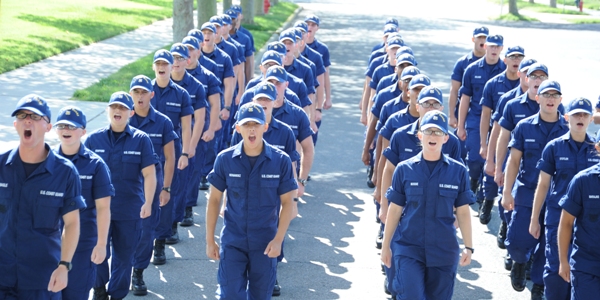The partial government shutdown that began in December last year and lasted through most of January may seem like a distant memory, but not at the U.S. Coast Guard.
Three months later, the Coast Guard is still recovering from the 35-day shutdown that deferred critical maintenance on its fleet of aging assets and forced some 42,000 Coasties to work five weeks without pay, causing great financial hardship to service members and their families. It was the longest ever government shutdown.
Since the Coast Guard is not part of the Defense Department, which was funded during the shutdown, its personnel was the only armed service required to work without pay — the first time this has happened in U.S. history.
This forced many to turn to food banks for help until back pay was restored. In a cruel irony, Coast Guard members often worked alongside members of other military branches who were being paid. At Coast Guard bases around the county, the civilian community rallied to help.
Legislative fixes are now being drafted in Congress, and lawmakers promise action so that this situation is not repeated should more shutdowns occur in the future.
At a hearing before the Senate Commerce Committee last week, Sen. Edward Markey, D-Mass, cited an alarming Coast Guard figure that said only 31% of active duty personnel had enough savings to cover one month of expenses.
“That is unacceptable and is not sustainable,” the Massachusetts Democrat said. “These funding disruptions harm recruitment and retention and the Coast Guard’s ability to fulfill their mission to assure nation’s maritime security, safety and stewardship.”

Commandant Adm. Karl Schultz delivered his first 'state of the Coast Guard' address March 21 in Los Angeles. Coast Guard video image
Coast Guard Commandant Adm. Karl L. Schultz acknowledged that morale among employees suffered during the shutdown but he praised their performance, and thanked Americans across the country for their help in caring for the needs of Coast Guard families. He said that national press coverage of the situation “raised our visibility.”
The shutdown came at a particularly bad time, as the Coast Guard is faced what Schultz calls a “tipping point” of readiness to perform a long and increasingly complex set of missions while waiting for new vessels to replace an aging fleet. Additionally the Service experienced lapses in appropriations last year while responding to an unprecedented raft of hurricanes and drug seizures.
“For an organization that is struggling with readiness, the shutdown doesn’t help,” the admiral told another hearing before the House Appropriations Subcommittee on Homeland Security. “It exacerbates that.”
He said the Coast Guard is about 75-to-80% recovered from the shutdown. “In the next month, we’ll be back to a good place,” ready to respond to the hurricane season, which starts in June. “We’ve been able to pay our bills and restock our shelves. And we’re on the road to recovery.”
But, he explained, lots of ground was lost in performing important maintenance work on aging assets. “The one thing we can’t get back is some of that deferred maintenance. But we’ll get after that,” the admiral said. “The Coast Guard is pretty darn resilient and adaptable force.”
In hearings across Capitol Hill and in the annual State of the Coast Guard address in April, Schultz said the Service’s readiness has eroded in recent years and he intends to turn that around. “Building sustained readiness is my absolute top priority and I’d say we’re at the tipping point on that front,” he said.
Unlike other armed services within the DOD, he said Coast Guard funding is considered non-discretionary and thus is excluded from efforts to rebuild the military. While DOD got a 12% increase in operations and support funds, he said, the Coast Guard received a four percent boost.
“We find ourselves on the outside looking in,” Schultz said, even though the Coast Guard spends nearly $1 billion a year on the growing demands of defense readiness. “In the meantime, our purchasing power has declined,” and the Coast Guard’s assets face a backlog of deferred repairs.
Treatment of Coast Guard personnel during the shutdown and the Service’s continual budget struggles offer more evidence of how the Service is treated differently than the Army, Navy, Air Force and Marines, even though it is considered the fifth armed service.
It’s time for Congress to pass legislation putting Coast Guard service members on parity with other military personnel and be paid during future shutdowns. Lawmakers should also reject the administration’s proposed 9% cut in the Coast Guard’s fiscal 2020 budget and assure a strong and undisrupted level of funding so that the admiral can meet his readiness goals. The maritime industry and the nation depend on it.



.JPG.small.400x400.jpg)

